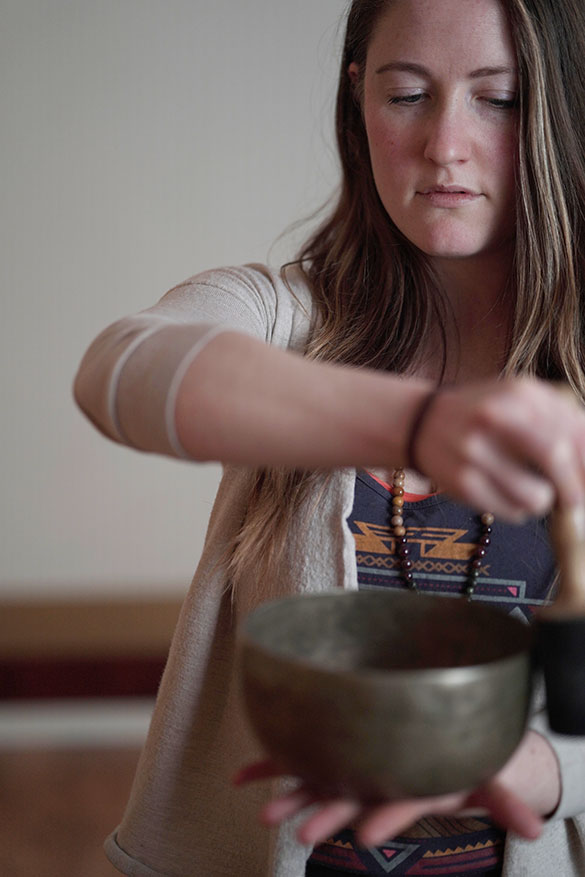
Teaching Mindfulness
As Jon Kabat-Zinn once said “Mindfulness is awareness that arises through paying attention, on purpose, in the present moment, and non-judgmentally”. Part of our development as yoga teachers is to deepen our understanding of the relationship between mindfulness, meditation, and yoga.
Teaching Mindfulness
Mindfulness is the ability to intentionally still the distracted mind so we can be present to the unfolding of our present moment experience; a clearer state of consciousness, awareness, acknowledgement, and harmonious connection to the inner self, cleaned up of the projections and conditioning of the mind. This skillfulness of mind is a foundational practice of meditation, which is, in turn, a key element of yoga.
But just as yoga is not just meditation, meditation is not just mindfulness. Mindfulness is a starting point on the path towards the true transformative heart of meditation. Mindfulness has a key role in the practice of an authentic transformational yoga, and is therefore crucial for yoga teachers to encourage and empower students to cultivate this skill in their practice. Doing so will enhance their yoga asana practice, deepening their intuitive connection with their spiritual self, and transforming the way in which they relate to events and the world, creating a more holistic, centred yoga experience.
What are the seven key principles of mindfulness?
Mindfulness is an all-encompassing term that tends to get thrown around these days, often without a deeper understanding of the actual meaning of the elements which enable practitioners to cultivate true mindfulness.
For yoga teachers, to practise and indeed teach true mindfulness, it is important to first grasp the seven key principles of mindfulness:
- Equanimity/Non-reactivity – Become aware of the constant stream of judging and reacting to inner and outer experience; cultivate balance of mind, equanimity, non-reactivity.
- Patience – A form of wisdom, patience demonstrates acceptance of the fact that things sometimes unfold in their own time. Allow for this.
- Open-mindedness – By maintaining an open and curious mind, we are more receptive to new possibilities, preventing us from getting stuck in the rut of our own expertise.
- Trust – Developing trust in your resourcefulness and intelligence, trust in the unfolding of experience.
Non-striving – The goal is to be with your experience right here, right now. Pay attention to what is unfolding in the here and now without trying to change anything. - Acknowledgement – See things as they are. This sets the stage for spontaneous right action; acting appropriately in your life no matter what is happening.
- Release – When we pay attention to our inner self, we discover there are certain thoughts, emotions and situations the mind wants to hold onto. Mindfulness hones your experience to be what it is right now.
These seven key principles of mindfulness are underpinned by the ancient Sanskrit text “yoga chitta vritti nirodah” from the second of Patanjali’s Yoga Sutras; in English, this is translated as “yoga is the cessation of the fluctuations of the mind.”

Why consider mentorship
Mentoring with a master teacher provides you with a clear path to professional development. You will receive personalised guidance on topics ranging from your personal practice, to your teaching skills, to how to move forward with your yoga career.
Our master teacher Susan Allen has over two decades of yoga practice, teaching, and guidance, and credits her most meaningful growth to the gift of mentoring from the world-class master teachers she has been fortunate enough to study with over the years.
Susan has run multiple yoga studios, teacher trainings, immersions, and retreats, and brings all of this experience to her mentoring. Harnessing her practical and technical skillset, she understands and teaches yoga pragmatically, creating a safe and collaborative space for personal development. She disseminates what she has learnt in easy to digest modules which cover both personal and professional growth goals.
How do you teach mindfulness in a yoga class?
The art of mindfulness is what differentiates authentic yoga from the contemporary yoga often seen in the media today, so it should come as no surprise that one of the most frequent questions asked by our client teachers is “How do you teach mindfulness in a yoga class?”.
We all know what mindfulness is, how important it is in the practice of yoga asana, and the interlinked role it plays in achieving a clear, tranquil, meditative state – but how do you turn that knowledge into wisdom that can be shared with a room full of yoga students, many of whom may not have the same level of understanding as the teacher?
While many students come to a yoga class assuming they are going to be engaging mostly in the physical practice of asana, we, as teachers, need to have a teaching strategy that gives them access to the greater holistic aspect of yoga; that is yoga which benefits the mind, spirit, and body – not just the body alone.
The ability to teach mindfulness is one of the core elements The Yoga Transition addresses as part of The Yoga Transition path, along with how to incorporate meditation into classes and meditation principles into asana.
We will teach you how to include creative and varied cues in your asana classes that awaken this intelligence of mindfulness in your students. In a well rounded class, some cues will be targeted for the annamayakosha – the physical form, some for the pranayama kosher – the energy body and breath, and some for the manomayakosha – the mind.

Develop your yoga teaching style with mentorship
Your initial teacher training would likely have touched on the basic principles of mindfulness, likely while also covering off meditation in the same short breath – but it’s impossible to gain a deep understanding of such a broad topic in a short amount of time. In addition to educating how best to teach mindfulness within a yoga studio setting, there are a vast number of teaching elements we help our professional yoga teacher clients develop.
At The Yoga Transition we celebrate individuality through:
- Diving deeper into teaching methodology and different styles
- Steering your practice and teaching in the direction that most interests you
- Encouraging you to discover your unique voice.
Once you have completed your initial teacher training, contact us to find out how mentorship can bring you to the next level.





